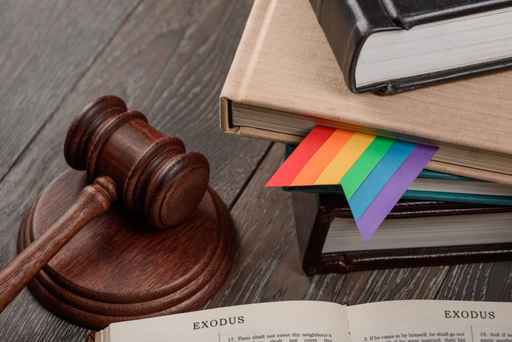A Kansas bill co-sponsored by an area legislator that says homosexuality is intrinsically religious and would ban counties from issuing marriage licenses to same-sex couples faces hurdles to becoming a law as well as criticism from some area political and religious leaders.
The Marriage and Constitution Restoration Act (HB 2320), introduced by Sabetha Rep. Randy Garber and co-sponsored by multiple representatives including Wamego Rep. Ron Highland, would define same-sex marriages as “parody marriages,” prohibit the state from legally enforcing any policies that permit or respect such marriages in addition to disallowing counties from issuing licenses for parody marriages. It also states that bestiality and objectophilia also fall under the umbrella of parody marriages.
Additionally, Kansas would be prohibited from extending any marriage benefits to those in same-sex marriages and it states that homosexuality is “inseparably linked” to the religion of secular humanism. Other provisions protect the legality of conversion therapy and ban public libraries and schools from holding drag queen storytime events.
Rep. Highland declined an interview with KMAN, but did say he hadn’t read the bill’s full text and trusted the word of a friend.
The Marriage and Constitution Restoration Act’s lead proponent, Rep. Garber, has expressed that he continues to stand by the bill in an interview with media last week.
Manhattan City Commissioner Jerred McKee was among those to voice opposition to the bill. McKee, who is gay, posted on Facebook a letter he wrote to Rep. Highland calling HB 2320 vile and offensive.
“This is a disgusting piece of legislation that is nothing more than a political stunt,” McKee writes. “While I am confident this bill will not pass it does not mean it does not have an impact. Bills like this do just as much damage to a gay teenager’s psyche as a Westboro Baptist Church sign.”
Michael Vollbrecht, also a gay man as well as pastor of the Peace United Church of Christ in Alma, spoke with KMAN and disagrees with the bill’s statement that homosexuality is linked to the religion of secular humanism. He says that members of the LGBTQ community can be found in every community and religion — including Christianity.
“To separate us, to continue to say that we are somehow less than or that we do not deserve the same protections, that we do not deserve the same marriages, that we do not deserve the same rights as straight people — that is very hurtful and I think really sad that we are still at that place in our nation’s history,” says Vollbrecht.
Dr. Brianne Heidbreder, Kansas State University associate professor of political science, says the question of how existing same-sex marriages would be treated would probably have to be worked out in the legislative process. Though Heidbreder did say that typically there are grandfather clauses that wouldn’t allow the legislation to be retroactively enforced.
Additionally, she says that the bill probably has some challenges in its path into the law books.
“If the bill were to even get through the committee process and then get to a vote in the entire chamber of the House and the Senate and pass with majority support, it would then go on to Gov. Laura Kelly — and I think everyone would expect that Gov. Kelly would veto this legislation,” says Heidbreder. “One of her first actions in office this year was to issue an executive order prohibiting state employers from discriminating against individuals who identify as LGBTQ.”
The legislation would then need two thirds of the House and Senate to overturn that veto, which Heidbreder says would be very tough and require complete Republican party unity. She says the bill would then face an immediate legal challenge due to the 2015 U.S. Supreme Court ruling that made marriage a right to same-sex couples nationwide.


